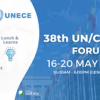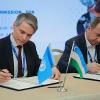News
Displaying Results 51 - 75 of 102
In the past few years, multiple shocks ranging from pandemics to conflicts have restricted the movement of goods and services, resulting in the number of countries facing significant disruptions in supply chains is increasing every year, affecting timely delivery of essential goods, such as food…
In June 2022, the World Trade Organization (WTO) Members agreed on the Ministerial Outcome Document, which marked for the first time the recognition of the importance of the multilateral trading system in addressing the triple global environmental crises of climate change and related natural…
With blockchain opening up many avenues in international trade – from facilitating financing and customs procedures to tracking due diligence and sustainability compliance – countries and companies are looking for successful practices to scale up their efforts to maximize the potential of this new…
July is a month to start enjoying the harvest of fruits and vegetables for many in Europe and the topic of reducing food loss and waste becomes very urgent. In Serbia, agriculture is an important sector of the economy, contributing around 6% of GDP. In March 2022 food production accounted for 10.4…
In view of the upcoming COP 27 of the UNFCCC, taking place in Egypt later this year, the growing threats on climate created by the textile and leather sectors call for our urgent action. If we continue down this path, we will fail by 50% to meet our 2030 emissions reduction targets, resulting in…
UNECE was engaged at the main global forum to assess and discuss progress in implementing the Sendai Framework for Disaster Risk Reduction (DRR) – the seventh session of the Global Platform for Disaster Risk Reduction (GP2022) held in Bali and online, 25-27 May 2022, fully embracing its theme: “…
Products today are integrating more and more advanced technologies and sustainability criteria into their design. Soft toys with computer chips, medical devices that can assist in operations and learn from past uses, repurposed plastic bottles assembled to form a new, different product… each pose…
Standards are an integral part of society and are present in nearly everything that surrounds us on a daily basis; they shape how products are designed, produced and used. They are in all products that cross borders and can play a key role to reduce technical barriers to trade as well as integrate…
Recent disruptions of supply chains have exposed fragilities in the current trading system and brought to light the importance of resilience and transparency in global trade.
UNECE and other international organizations play a crucial role in supporting countries (including both the public and…
As an established convenor of standards developing organisations, UNECE encourages the integration of a gender perspective, providing practical steps for organisations to advance women’s full and effective participation in standards and standards development. With the objective of strengthening…
The textile industry is a key driver of Uzbekistan’s economy, reflected in the country’s rank as sixth largest cotton producer in the world. In 2021, the country accelerated the battle against its child and forced labor violations in cotton harvest according to a new International Labour…
As supply chains within the garment and footwear sector are becoming increasingly complex, the need for transparency is more relevant than ever. Consumers, investors and shareholders are pressing for transparent business activities as well as the prevention and mitigation of risks in value chains,…
There is overwhelming evidence that we need robust management and traceability for the sustainable and circular supply and use of climate-critical raw materials. Calls are increasing for the production of raw materials to embrace circularity. Demand for batteries and other low carbon technologies…
Global trade has been transformed repeatedly throughout history, driven by new business processes and new policies. The new advances in digitalization now promise further transformation by making it faster, more transparent, reducing risks of red tape and corruption. With the increase in global…
Over 60 participants worldwide joined the online roundtable organized by the UN Digital transformation group for Europe and Central Asia (DTG4ECA) in the framework of the Regional Forum on Sustainable Development for the UNECE region. Established in May 2020, DTG4ECA group, co-chaired by UNECE and…
Minerals such as lithium, cobalt, and copper are essential for digitalization, for renewable energy technologies, and for the further deployment of electric vehicles. Demand for these and other minerals – known as “critical raw materials” (CRMs) – is growing fast as governments and businesses act…
Strengthening value chains between Africa and the European Union (EU) is a priority objective for sustainable growth and decent jobs across the two continents. Recent market imbalances and disparities, involving supply chain disruptions and lack of attention to the social and environmental impacts…
A variety of European and African representatives from business, science, and government presented initiatives to raise awareness of universal sustainable resource management systems at the EU-Africa Business Forum. Experts called for further integration of European and African value chains through…
UNECE led a coalition of international experts to train raw material experts in sustainable resource management.
COP26 added much needed impetus towards climate action. Raw materials will be a pivotal part of the conversation in driving innovation in a regional circular economy including recycling…
The global economy enters 2022 with new challenges. Almost two years into the Covid-19 pandemic the digitalization of transport and trade data flows is on top of the economic agenda. In response, UNECE organized its 4th workshop on trade facilitation, Single Window, and data sharing for the Western…
If the world is to deliver on climate change and attain the 2030 Agenda for Sustainable Development objectives, we must optimize our endowments of natural resources. A resilient and sustainable supply of natural resources, including critical raw minerals, is essential for sustainable energy,…
Trade facilitation is a key priority for Kyrgyzstan and its trading community for participation in the global and regional trading system. Under the project on “Strengthening the capacity of the Kyrgyzstan National Trade Facilitation Council to implement the WTO Trade Facilitation Agreement”, UNECE…
Complex global value chains include production facilities scattered all over the world. Sometimes, they may also involve practices of illegitimate subcontracting and undeclared informal work. In fact, their complexity and opacity make it very hard to gain accurate information about how and where…
As all eyes turn to Glasgow where world leaders have gathered at COP26 for crucial negotiations to cut greenhouse gas (GHG) emissions and limit global warming, UNECE experts highlight how improved transparency and traceability could be part of the solution. The private sector has a vital role to…
The Group of 7 nations (G7), six of which are UNECE member States (Canada, France, Germany, Italy, the UK and the US), took bold step towards reducing barriers to trade by agreeing on the principles to govern cross-border data use and digital trade. At their meeting in London on 22 October,…


























